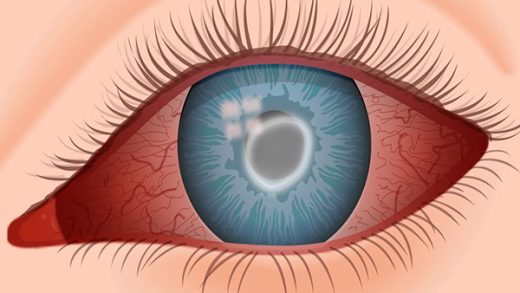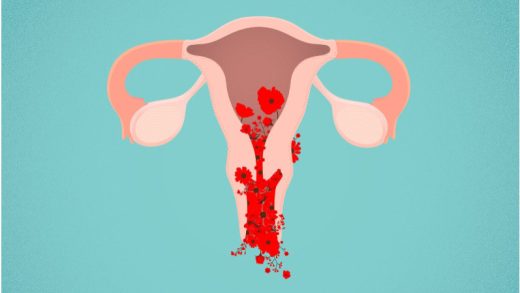What is abnormal uterine bleeding (menometrorrhagia)?
When you bleed outside of your monthly cycle or experience exceptionally heavy or prolonged periods, it is known as abnormal uterine bleeding (formerly known as menometrorrhagia). Every 21 to 35 days, a normal menstrual flow usually lasts for five days.
Notifying your provider of any unusual bleeding is important. It is possible that the cause of your bleeding is benign. However, bleeding could indicate cancer or other illnesses that could impair your ability to conceive.
What is the difference between menorrhagia and menometrorrhagia?
Menometrorrhagia was once an umbrella term for two different conditions that sound nearly the same:
- Menorrhagia: excessive and/or prolonged menstruation.
- Metrorrhagia: excessive, prolonged and/or irregular bleeding unrelated to menstruation.
To avoid confusion, the names were changed in 2011 by the International Federation of Gynecology and Obstetrics (FIGO). Heavy menstrual bleeding has replaced the term menorrhagia. We now refer to menometrorrhagia as abnormal uterine bleeding.
Who does it affect?
The majority of bleeding in individuals in their reproductive years who are not pregnant is referred to as “abnormal uterine bleeding.” However, this does not negate the possibility that irregular bleeding will still affect post-menopausal or pregnant women.
Get in touch with your provider if you have gone through menopause and are bleeding. After menopause, bleeding is never typical. Blood can have colors ranging from red to pink to brown to even rust.
Additionally, if you are bleeding while pregnant, you should get in touch with your doctor. Some causes are harmless, but others require medical attention, especially if the bleeding happens late in your pregnancy.
How common is abnormal uterine bleeding?
Not every woman with unusual uterine bleeding reports having these symptoms. Because of this, 10% to 35% of women globally may experience irregular menstrual bleeding. However, the figures might be higher. Menarche, the start of menstruation, and perimenopause, the years preceding menopause, are the times when it occurs most frequently.
Abnormal bleeding in the uterus is frequently caused by hormone imbalances. Those whose periods are about to start or are almost over are most likely to experience them.
Symptoms and Causes
What are the signs and symptoms of abnormal uterine bleeding?
The signs of abnormal uterine bleeding can vary. Some signs that your bleeding may be abnormal include:
- Heavy menstrual bleeding (formerly called menorrhagia).
- Bleeding at unusual times (between periods, after intercourse).
- Unusually long periods (seven days or longer).
- Inconsistent menstrual cycles.
What causes abnormal uterine bleeding?
Abnormal uterine bleeding can have many causes, including a variety of medical conditions and even stress:
Hormone imbalances
- Anovulation.
- Thyroid disease.
- Polycystic ovary syndrome (PCOS).
Being overweight increases the risk of hormone imbalances, which can also result in abnormal uterine bleeding.
Structural abnormalities in your uterus
- Polyps.
- Fibroids.
- Adenomyosis.
Precancer and cancer
- Uterine cancer.
- Cervical cancer.
- Vaginal cancer.
- Ovarian cancer.
- Endometrial hyperplasia.
Infections
- Trichomoniasis.
- Cervicitis.
- Chlamydia.
- Gonorrhea.
- Endometritis.
- Vaginitis.
Other medical conditions
- Von Willebrand disease.
- Liver disease.
- Kidney disease.
- Pelvic inflammatory disease (PID).
- Leukemia or platelet disorders.
Medications
- Blood thinners and aspirin.
- Hormone replacement therapy.
- Tamoxifen (breast cancer drug).
- Intrauterine devices (IUDs).
- Birth control pills and injectables (NuvaRing®, Depo-Provera®, Implanon®).
Retained foreign bodies and trauma
Forgetting to remove an IUD can lead to infection and abnormal bleeding. Trauma to your uterus, caused by an injury, can also cause bleeding.
Diagnosis and Tests
How is abnormal uterine bleeding diagnosed?
Your healthcare provider will ask you several questions when working to diagnose abnormal uterine bleeding. These questions may include:
- What brings on the bleeding?
- What other symptoms are you experiencing?
- Are you pregnant?
Your healthcare provider will then do a physical exam, including:
- A pelvic exam.
- A cervical exam.
- A Pap smear (Pap test).
What tests will be done to diagnose this condition?
Your healthcare provider may order several tests or procedures when diagnosing abnormal uterine bleeding. These tests may include:
- A pregnancy test. A miscarriage causes heavy bleeding. You can test positive on a pregnancy test up to 35 days after a miscarriage. Light bleeding is also common in the early stages of pregnancy.
- Blood tests. Your provider can check how your blood clots and do a complete blood count.
- A thyroid test. Problems with your thyroid function may be a sign that there is also a problem with your ovary function that could be causing your bleeding.
- Hormone levels test. Hormone imbalances may be causing your abnormal bleeding, or they may be a sign of a condition causing your bleeding.
- A hysteroscopic exam of your uterus lining (endometrium). This test checks for fibroids, polyps or signs of cancer.
- A pelvic ultrasound. Imaging allows your provider to check for any growths in your reproductive organs that may be causing your bleeding. A sonohysterogram, also called saline-infusion sonography, is a highly sensitive imaging procedure that can help your provider identify abnormal structures in your uterus, like polpys or fibroids.
- A biopsy of your endometrium. Your provider can collect tissue samples from your uterus lining and check for signs of cancer or pre-cancer cells.
Management and Treatment
How is abnormal uterine bleeding treated?
The reason behind your bleeding will determine how you are treated. You can treat the cause of your bleeding or manage it with medication and surgery.
Medications
Medications used to treat abnormal uterine bleeding include:
- Birth control pills.
- Progestin (can be given by a shot, implant or device placed in your uterus called an IUD).
- Nonsteroidal anti-inflammatory drugs (NSAIDs), such as ibuprofen (Advil®, Motrin®).
- Gonadotropin-releasing hormone (GnRH) agonists can temporarily stop or reduce bleeding by preventing ovulation.
- Gonadotropin-releasing hormone (GnRH) antagonists (elagolix®) can manage heavy period bleeding related to fibroids.
Surgery
Treatment options for abnormal uterine bleeding are numerous. Find out from your provider how frequently they carry out a particular procedure. Having a procedure done by a provider who does it frequently results in a quicker recovery and fewer complications.
- Hysteroscopy. A procedure where your provider removes atypical structures in your uterus, like fibroids and polyps.
- Uterine artery embolization. Stops blood flow to fibroids, causing them to shrink.
- Myomectomy. Removes fibroids while keeping your uterus intact and preserving your ability to get pregnant and have children.
- Endometrial ablation. Destroys your uterus lining through the use of a laser, heat, electricity, microwave energy or freezing. You shouldn’t have this procedure if you want to get pregnant and have children.
- Hysterectomy. Removes your uterus. Hysterectomy is often used to treat cancer or cancerous changes in your endometrium. Advanced stages of cancer may need radiation or chemotherapy.
Prevention
How can I reduce my risk?
Many causes of abnormal uterine bleeding are unpreventable. However, you can lessen your chance of developing some illnesses that cause unusual bleeding. For example, hormone balance may be preserved through maintaining a healthy weight. A high-animal-fat diet can lower your risk of developing certain types of cancer. By engaging in safer sexual behavior, you can lower your chance of contracting some STIs that can result in irregular uterine bleeding.
Outlook / Prognosis
What can I expect if I have this condition?
What is causing your bleeding will determine how you are diagnosed and what treatments you can have. Your doctor will evaluate a number of factors, such as your age, symptoms, and risk factors for certain conditions that result in abnormal bleeding, when making a diagnosis.
Based on your physical examination and medical history, your provider can customize your care plan, including treatment options and diagnostic options.
Living With
When should I see my healthcare provider?
Schedule an appointment with your provider if you’re noticing abnormal uterine bleeding so that they can address the underlying cause.
Symptoms to watch out for include:
- Passing blood clots that are the size of a quarter or larger.
- Changing menstrual products less than every two hours.
- Bleeding in between periods or for longer than a week.
- Symptoms of anemia, like feeling fatigued, weak, or short of breath.
- Symptoms of pica, which include hair loss, pale skin and the urge to eat non-food items (paper, hair, dirt, etc.)
See your provider if your quality of life is affected by abnormal bleeding. To control your blood flow, you should not need to use more menstruation products than usual. Heavy or unpredictable bleeding should not force you to forgo enjoyable activities or public outings.
What questions should I ask my provider?
- Do I have heavy menstrual bleeding?
- Does my blood loss put me at risk for developing other health conditions?
- Am I bleeding so much that I’m at risk of developing anemia?
- What are the pros and cons of the treatment options available to me?
- What are the best treatment options available if I wish to get pregnant in the future?
- Will you administer my treatment alone, or will it involve a care team?
- What surgical experience do you have in treating abnormal uterine bleeding? Is this a routine part of your practice?
A note from DocAdvice
You are the greatest arbiter of what constitutes normal for you, including the duration of your periods and the intensity of your bleeding. Consult your healthcare provider if you are experiencing unusually heavy or prolonged periods, or if you are bleeding outside of your menstrual cycle. You should never be ashamed of yourself or suffer in silence. You have a lot of non-invasive treatment options at your disposal to stop your bleeding.





















